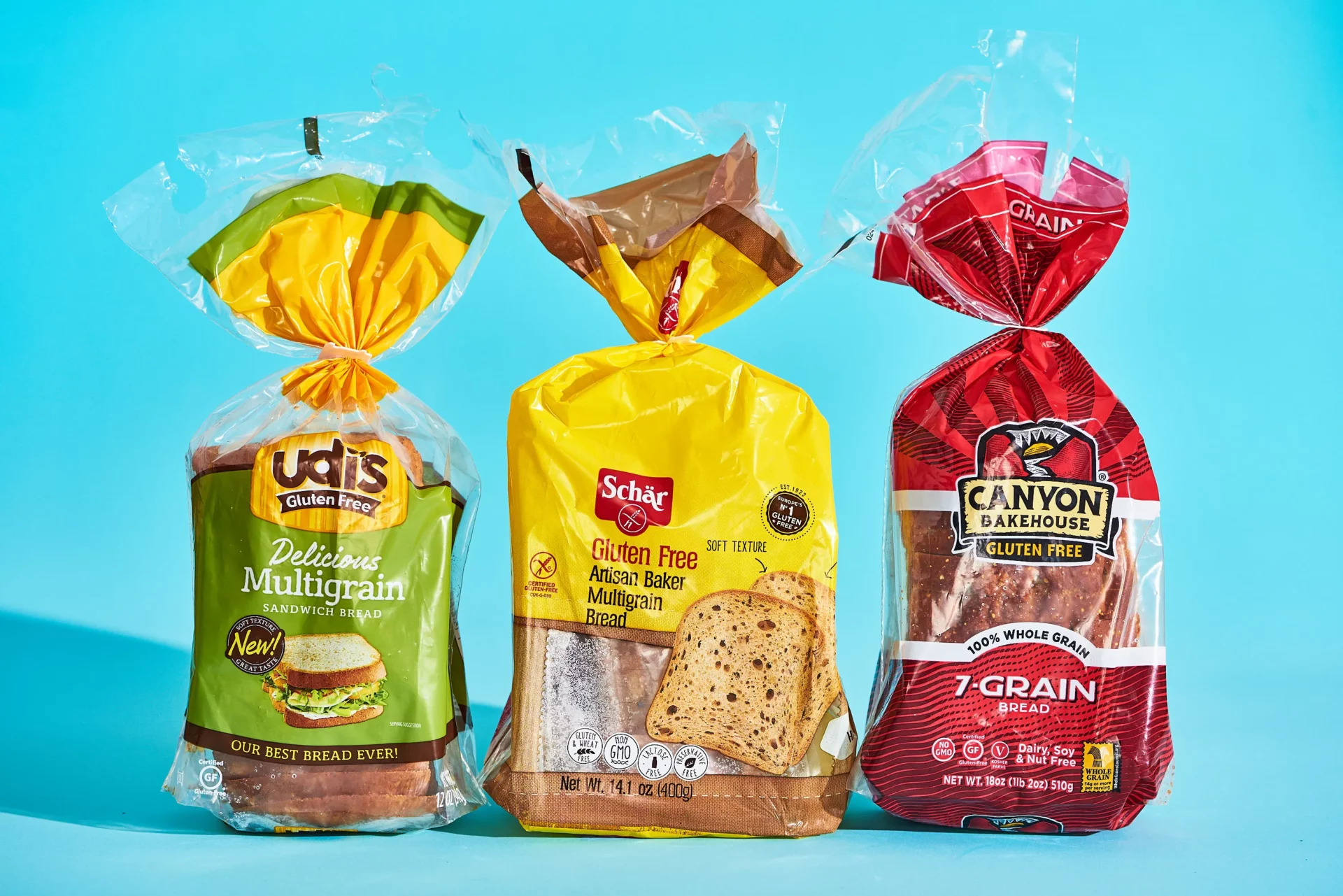Gluten-free bread has gained significant attention in recent years.
Gluten is a mixture of proteins found in wheat, barley, and rye and it gives bread characteristic like elasticity and chewiness.
The digestibility of gluten-free bread varies among individuals.
For individuals suffering from celiac disease, gluten-free bread is certainly easier to digest because consuming gluten would cause gastrointestinal and systemic symptoms.
While for normal individuals, the digestibility of gluten-free bread can be similar or even more challenging than regular bread, depending on its ingredients.
Normal individuals without celiac disease, might find certain alternative flours or binders hard to digest, leading to bloating or discomfort.
Thus, while gluten-free bread can be a boon for those sensitive to gluten, it’s not universally easier to digest for everyone.
Understanding Gluten
Gluten is a general name for the proteins found in wheat, barley, rye, and triticale.
These proteins act as a binding agent, giving elasticity to dough and providing a chewy texture to baked products.
Specifically, gluten is made up of two main protein components: gliadin and glutenin.
When flour is mixed with water, these proteins form a sticky network that has a glue-like consistency, hence the name ‘gluten’.
Common Sources Of Gluten In The Diet
Wheat-based foods: This includes bread, pastas, cereals, cakes, pies, and cookies.
Wheat variants like spelt, kamut, farro, and durum, as well as products like wheat germ and wheat bran, also contain gluten.
Barley: Found in foods like malt, malted barley flour, malted milkshakes, and malt extract.
Rye: Commonly found in rye bread and rye beer.
Processed foods: Many processed foods may contain gluten as a filler or stabilizing agent.
These can include sauces, soups, processed meats, salad dressings, and seasonings.
Beer: Most beers are brewed from malted barley or wheat and thus contain gluten. However, there are gluten-free beers available in the market.
Advantages Of Gluten Free Bread
Essential for Celiac Disease Patients: For individuals with celiac disease, gluten-free bread is not a choice but a necessity.
Eating gluten can cause severe health complications for these individuals, including damage to the small intestine.
Relief for Non-Celiac Gluten Sensitivity: Some people experience symptoms similar to celiac disease when they consume gluten but don’t have the autoimmune response characteristic of celiac disease.
Gluten-free bread can help alleviate their symptoms.
Digestive Comfort for Some IBS Sufferers: Some individuals with irritable bowel syndrome (IBS) find relief from their symptoms when they avoid gluten-containing foods.
Reduced Exposure to FODMAPs: Some gluten-free breads are made with ingredients lower in FODMAPs (fermentable oligosaccharides, disaccharides, monosaccharides, and polyols).
Reducing FODMAPs can be beneficial for certain individuals with digestive concerns.
Drawbacks Of Gluten Free Bread
Nutritional Deficits: Gluten-free breads are sometimes made with refined grains or starches like rice flour, tapioca starch, or potato starch, which lack the fiber and nutrients found in whole grains.
Taste and Texture Differences: Gluten provides the elasticity and chewiness characteristic of traditional bread.
Gluten-free breads can sometimes have a different texture or taste that may not be as appealing to some individuals.
Increased Additives: To replicate the texture of regular bread, many gluten-free breads contain added gums, fillers, and other ingredients.
These can sometimes cause digestive discomfort in sensitive individuals.
False Sense of Healthiness: Just because a bread is labeled gluten-free does not automatically make it healthier.
Some gluten-free breads can be high in sugars, fats, and artificial ingredients.
Limited Availability: In some areas or restaurants, gluten-free bread options might be limited or unavailable.
What Makes Gluten-Free Bread Easier To Digest For Some Individuals?
Gluten-free bread may be easier to digest for individuals with gluten sensitivities or celiac disease, as it lacks gluten, the protein responsible for creating digestive discomfort.
By eliminating gluten, the digestive system may experience less irritation and inflammation, allowing for a more comfortable digestion process.
Additionally, some gluten-free bread contains alternative grains or ingredients that may be gentler on digestive systems.
However, the ease of digestion can vary from person to person and it’s always advisable to consult with a healthcare professional if experiencing digestive issues.
Is Gluten-Free Bread A Good Option To Improve Digestion?
While gluten-free bread can be beneficial for those with gluten sensitivities or celiac disease, it’s not a universal solution for improving digestion.
Individuals without gluten issues may not see a significant difference in their digestion by switching to gluten-free bread.
In some cases, gluten-free bread may lack dietary fiber which is essential for healthy digestion.
It’s always advisable to look at the nutritional label and consider the overall dietary needs before making a switch.
Can Gluten-Free Bread Help Alleviate Symptoms Of IBS?
For some individuals with irritable bowel syndrome (IBS), consuming gluten-free bread might help alleviate symptoms.
However, the effectiveness of a gluten-free diet in managing IBS symptoms varies from person to person.
It’s important to note that IBS is a complex condition and what works for one person may not work for another.
What Are The Ingredients In Gluten-Free Bread That Aid In Digestion?
Gluten-free bread is often made from alternative flours such as rice flour, almond flour, or coconut flour which may be easier to digest for individuals with gluten sensitivities.
Some gluten-free breads also contain ingredients like chia seeds or flaxseeds which are known for their digestive health benefits.
Moreover, some gluten-free breads have extra vitamins and minerals added to them, or they include more fiber, which can help with digestion.
Does Gluten-Free Bread Cause Less Bloating?
Individuals with gluten sensitivities or celiac disease often experience bloating when consuming products containing gluten.
Gluten-free bread is likely to cause less bloating in such individuals.
However, the extent to which bloating is reduced can vary from person to person.
It’s important to note that other ingredients in gluten-free bread could also contribute to bloating, especially if someone has sensitivities to those ingredients.
Are There Any Digestive Additives In Gluten-Free Bread That Assist In Digestion?
Some gluten-free breads may contain digestive enzymes or additives to aid in digestion or improve the bread’s texture and nutritional profile.
Ingredients like alpha-galactosidase or lactase are sometimes added to help with the digestion of certain carbohydrates.
However, the inclusion of these enzymes or additives can vary widely among different brands and types of gluten-free bread.

